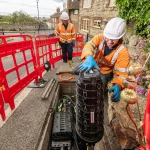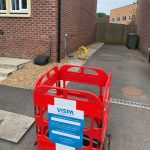Study Claims Poor Broadband and Mobile Drives People Out of UK Rural Areas

A new Strand Partners survey of 4,000 members of the UK public, which was commissioned by broadband and mobile providers Virgin Media and O2 (VMO2), has claimed that over a third of rural residents (or 66% of “young people“) are likely to be considering a move away to a town or city in the next 12 months. Poor internet connectivity is one of the key drivers for this.
According to the survey, the young people who are looking to leave rural areas claim that the main driving forces behind this include a lack of career opportunities (30%), poor access to services (25%) and a lack of “high-quality connectivity” (24%).
The research finds that many rural residents are struggling to access the internet, with 48% of those living in rural areas experiencing connectivity problems at least “a few times a week“, although the survey makes no attempt to define this (i.e. what kind of connectivity problems and are they related to network operators or devices within the home etc.?).
Advertisement
In addition, some 51% of rural Britons said their ability to work from home is negatively impacted by “poor connectivity“, with 30% claiming to not have adequate connectivity to work remotely at all. But the survey didn’t attempt to answer whether those surveyed could have perhaps found a better service via a different mobile or broadband provider. The survey only seems to consider the user’s existing experience and not wider network availability / choices or whether alternatives, like Starlink, might be viable.
Finally, 57% of rural residents were found to be worried that the departure of young people could make rural areas less desirable and lead to businesses pulling planned investments from the countryside. But VMO2 does make the point that the £1bn Shared Rural Network (SRN) project and the £5bn Project Gigabit scheme are working to improve rural 4G and gigabit-broadband cover.
However, the real purpose of this survey is to act as another vehicle for VMO2 to encourage the new UK Labour-led government to ensure that their Planning and Infrastructure Bill makes it “faster and easier to deliver essential new mobile and broadband infrastructure” (details here and here). For example, VMO2 notes how planning applications for new 4G and 5G mobile masts can take over 6 months to be approved on average.
Jeanie York, CTO of Virgin Media O2, said:
“Our research shows that poor connectivity is pushing Britain’s countryside into crisis. From deserted high streets to fewer job opportunities and issues accessing essential services, rural residents are telling us loud and clear that poor connectivity is hampering their daily lives.
The industry has a £1 billion plan to improve rural connectivity, but the Shared Rural Network relies on collaboration between industry partners, the UK Government, planning authorities and landowners.
Alongside existing investment, we need better rules in place to make it easier and faster for the industry to deliver what we promised to disconnected rural communities. The government must implement its Planning and Infrastructure Bill as a matter of urgency. It’s the only way to empower a new generation of rural innovators and revitalise high streets and communities across the countryside.”
Boosting rural deployments via planning reform and other changes is definitely something that network operators, as well as those suffering from the poorest levels of digital connectivity, might welcome. But the new government will also have to tread carefully, given the current and somewhat growing opposition – at the local level – to the deployment of new poles (telegraph poles) for running fibre optic lines.
Advertisement
Similar gripes are often also levelled against new mobile masts. But a lot of related planning applications for those can also be held up by frivolous or vexatious complaints, often coming from people who don’t even live in the affected area.
Suffice to say that striking the right balance on such issues remains fraught with difficulty, while completely trusting network operators to only ever do the right thing inside a community may be unwise (some do and others will try to force poles into private gardens etc.).
Mark is a professional technology writer, IT consultant and computer engineer from Dorset (England), he also founded ISPreview in 1999 and enjoys analysing the latest telecoms and broadband developments. Find me on X (Twitter), Mastodon, Facebook, BlueSky, Threads.net and Linkedin.
« Full Fibre UK ISP GoFibre Celebrates First Year of Community Fund






















































I do wonder why some of these firms commission these surveys.
Especially in this case, where Virgin Media has hardly any rural footprint (though their related company Nexfibre is making promises there) and O2’s pretty pants for data performance too. Look at these forums – no one’s asking how to make their O2 4G/5G better for home use, it’s always EE or Three.
As someone from a rural area who had to wait for far too long to get ADSL, it wasn’t broadband that got me to move away. Ironically its the properties even more rural than my parents who have FTTP now, whereas they’re still on VDSL…
Usually as a subtle way of begging for government money.
What on earth has VMO2 got to say about rural broadband?
That they’ve ignored it for decades?
Its a huge problem in deep rural areas, I’ve seen it first hand, but I’ve also seen it start to reverse when FTTP schemes eventually reach these areas, but 10 years too late. Sadly the majority where I live are still stuck on long line ADSL.
I notice how the article seems to suggest that this could be go try to get Labour to reform planning applications but I think it’s also important to notice that O2 are “leaving the vanity metrics behind” and giving rural areas the same level of access as urban ones.
If they actually really cared about this, they would have done this YEARS AGO. I live in a Vodafone host area as I have expressed on the forums numerous times and 4 sites here remain on O2 2G only.
God knows what people are going to do for connectivity once 2G turns off, and I don’t believe there’s any access issues with the sites.
If you want to do your own research on the sites that I’m referring to: O2 Site 112, O2 Site off Eastern Avenue in Mitcheldean, O2 Site in Parkend, O2 Site near the Muller building in Stonehouse. Complete joke.
I live in an urban area and have zero fibre options (no VM either). Plus all 4 mobile networks are for purely cosmetic reasons – data coverage is so bad you can’t even send a WhatsApp message sometimes. Many rural areas fare better than us due to various interventions (SRN, Project Gigabit and so on).
We get nothing, and we can do nothing about it. No one wants to know, no one will listen. We are considering moving…
The lack of broadband – now a must have utility – is performing the equivalent of using sheep grazing as excuse in the Highland Clearances of the last millennium.
Needs a right clearance to occur in OFCOM to grow some and government to legislate BB provision into law.
JFDI
– Or suffer the unforeseen consequences, AGAIN,as did our ancestors.
Learn to learn from history, it IS that important!
Apologies, rant over…. but, really, this neglect has gone on way too long.
It has nothing to do with how expensive houses are in small villages or rural locations, then?
I’d love to live somewhere more rural, even if it meant slightly slower broadband was the trade off.
Hi Rik
I would love it to work like that, deprive the privileged lot of ’em !
Sadly, the people who would benefit to the greatest extent are the farm staff, shepherds and hotel / catering people on low incomes Terrible, slow costly BB access, to benefit from cost saving deals by shopping, trading and possibly, for a bigger income, working, online.